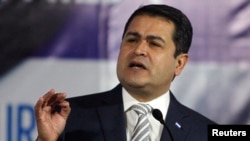U.S. lawmakers' inability to reach an agreement on immigration policy is at least partly to blame for a crisis that has seen thousands of children flee Honduras for the U.S. border, Honduran President Juan Hernandez said on Thursday.
Human and drug traffickers are “perversely” exploiting confusion about U.S. immigration policy, Hernandez told reporters on Capitol Hill, flanked by Guatemalan President Otto Perez Molina and U.S. House of Representatives Democratic leader Nancy Pelosi, before a meeting with House Democrats.
Traffickers encourage Central Americans to risk the dangerous journey north by telling them that U.S. policy allows them to stay in the United States.
Hernandez, Perez Molina and El Salvadoran President Salvador Sanchez Ceren are scheduled to meet on Friday with U.S. President Barack Obama and Vice President Joe Biden to discuss ways to stop the flow of children migrating from the three Central American countries.
An estimated 90,000 “unaccompanied minors” are projected to show up at the U.S. border with Mexico this year, hoping to escape gang violence, poverty and domestic abuse and join relatives in the United States.
The children have overwhelmed U.S. resources at the Texas-Mexico border and are also creating a political problem for Obama, who has long been pushing for changes to U.S. immigration policy.
The U.S. Senate, controlled by Obama's Democrats, last year passed a comprehensive immigration bill that would provide a pathway to citizenship for nearly 12 million undocumented residents, some of whom are now encouraging their children in Central America to come to the United States.
But the legislative effort died amid opposition from House Republicans.
Hernandez, speaking in Spanish through a translator, called “coyote” drug smugglers “an enormous criminal hulk” and said that while many operate in Central America and Mexico, others are “firmly planted ... in the United States under American jurisdiction.”
The criminal gangs prey upon children in Central America, threatening violence and death if they refuse to join their gangs. But they also promise to bring children to the United States - for a large fee - to be reunited with their relatives.
U.S. officials are pushing the governments of Honduras, Guatemala and El Salvador, home to most of the migrant children, to do more to get the message out that they will not be allowed to stay in the United States.
The U.S. Congress is deeply divided over Obama's request for $3.7 billion in emergency funding to help address the crisis.
Both the Senate and Republican-controlled House are considering cutting the funding level. But Republicans also want to attach changes to a 2008 anti-trafficking law that would let Obama deport the children more quickly, which would discourage the illegal migration.
Democrats say any such move must be considered separately from the emergency funds. Pelosi, who opposes changing the 2008 law, said attention needs to be paid to the children's humanitarian needs and “due process” in their deportation proceedings.





